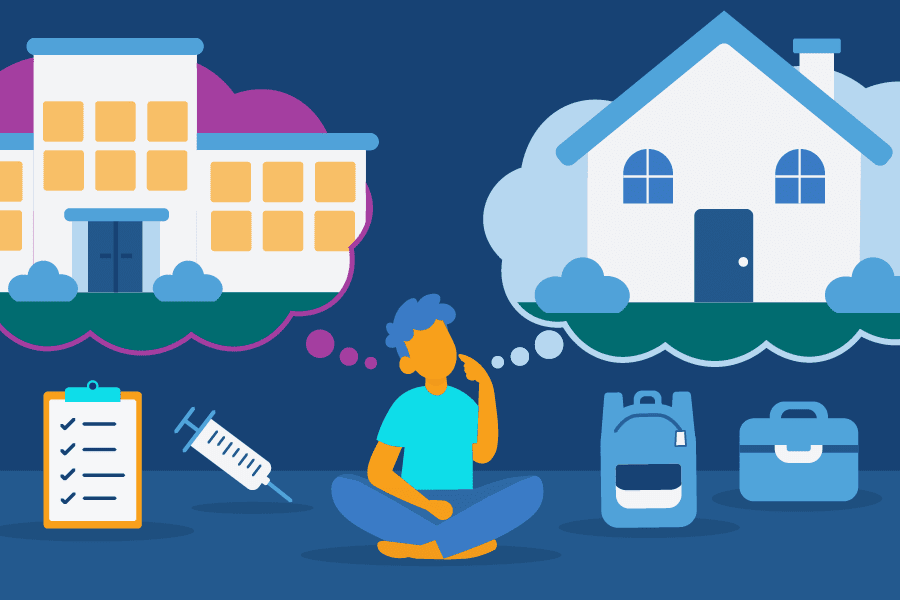Pros and Cons of Day Treatment for Substance Abuse
Day treatment, also known as partial hospitalization (PHP), generally consists of at least 25 hours per week of care. Clients live at home or in a recovery living facility while in day treatment. Day treatment is more time and therapy intensive than the intensive outpatient (IOP) level of care, but is less intensive than inpatient or residential programs, in which participants live at the treatment facility.
Pros of Day Treatment Programs
There are many benefits of day treatment programs to consider. Consider the pros before deciding if the program is right for your situation.
High level of Care Without the Price Tag of a Residential Program
Day treatment is the highest level of outpatient care available. Sandstone Care’s Day Treatment Program for adolescents and young adults struggling with substance abuse is approximately 40 hours per week, 5 days a week. This provides clients with a great deal of structured support, and as much or more clinical contact time as many residential programs, but without the expense and disruption of residential treatment.
Mental Health & Substance Abuse Focus
A good day treatment program for substance abuse will also address mental health and co-occurring disorders such as anxiety and depression. Day treatment programs have enough clinical hours that they can truly dive into building the skills and learning the concepts necessary to support not only sobriety but also a lifetime of mental health.
School Community
While Sandstone Care’s Day Treatment Program is personalized to each individual’s unique situation and goals, clients are often able to keep up and/or catch up on schoolwork through an online curriculum. Dedicated academic and vocational coaches support clients in staying on track in school.
Family Participation
Day treatment allows for a great deal of family participation and feedback. Clients continue to interact with their family on a regular basis, and have the opportunity to apply new skills in real time. Sandstone Care’s Day Treatment Program also includes a caregiver support group, a multi-family group, and individual and family therapy. Residential programs often have occasional family weekends, but families do not have the opportunity to practice what they are learning until their loved one comes home and they are no longer connected to a support system.
Community of Peers in Recovery
Participating in a local day treatment program means that clients are building a community of individuals with similar goals and struggles. A great strength of outpatient programs is that these relationships can last beyond just the duration of treatment, unlike residential programs in which clients often scatter across the country when they have completed that phase of treatment.
Cons of Day Treatment
For some, day treatment may provide either too little in the way of structure and support or too much. The best way to determine an appropriate level of care is a professional assessment. However, here are some drawbacks and general guidelines on when day treatment may not be the best level of care.
Lack of Constant Supervision
If a person poses an imminent threat to the safety of themselves or others (i.e. suicidal ideation, homicidal ideation, severe self-harm, possibility of overdose), they may require hospitalization or inpatient treatment until they are stable enough to be safe without constant supervision.
Withdrawing from Work or School
Alternately, if a person is successfully holding down a job or keeping up with school, it may do more damage than good for them to quit or withdraw in order to pursue treatment. In this case, intensive outpatient care may be more appropriate, as it allows them to continue to work or stay in school while also getting support with substance abuse and co-occurring disorders.
Greater Time Commitment for the Entire Family
Day treatment programs such as Sandstone Care’s are ideal for clients with an engaged family or support system. One of the great benefits of this level of care is that it allows the family to truly be a part of treatment and to work together on addressing the real-time issues that they face throughout the recovery process.
For families looking for a quick fix or who are unwilling to address their own part in the problem, day treatment may not seem like the most attractive option. However, even for families who balk at the commitment, it is important to note that in the long run family involvement is key to successful recovery.
Living at Home
If family conflict is so high that a client is unable to successfully live at home, they may require residential care. However, there are also options such as recovery living as an adjunct to day treatment for young adults that find themselves in this situation. Many families also find that once they together start participating in the recovery process, family dynamics shift and conflict decreases.
It is a good idea to give day treatment a try before sending a loved one to residential care. This gives everyone involved an opportunity to demonstrate their ability to be successful at home, knowing that if they are unable to be successful at an outpatient level of care, they may need inpatient treatment.





